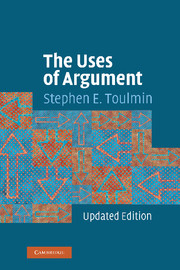Book contents
- Frontmatter
- Contents
- Preface to the Updated Edition
- Preface to the Paperback Edition
- Preface to the First Edition
- Introduction
- I Fields of Argument and Modals
- II Probability
- III The Layout of Arguments
- IV Working Logic and Idealised Logic
- V The Origins of Epistemological Theory
- Conclusion
- References
- Index
Preface to the Updated Edition
Published online by Cambridge University Press: 05 June 2012
- Frontmatter
- Contents
- Preface to the Updated Edition
- Preface to the Paperback Edition
- Preface to the First Edition
- Introduction
- I Fields of Argument and Modals
- II Probability
- III The Layout of Arguments
- IV Working Logic and Idealised Logic
- V The Origins of Epistemological Theory
- Conclusion
- References
- Index
Summary
Books are like children. They leave home, make new friends, but rarely call home, even collect. You find out what they have been up to only by chance. A man at a party turns out to be one of those new friends. ‘So you are George's father? – Imagine that!’
So has been the relation between The Uses of Argument and its author. When I wrote it, my aim was strictly philosophical: to criticize the assumption, made by most Anglo-American academic philosophers, that any significant argument can be put in formal terms: not just as a syllogism, since for Aristotle himself any inference can be called a ‘syllogism’ or ‘linking of statements’, but a rigidly demonstrative deduction of the kind to be found in Euclidean geometry. Thus was created the Platonic tradition that, some two millennia later, was revived by René Descartes. Readers of Cosmopolis, or my more recent Return to Reason, will be familiar with this general view of mine.
In no way had I set out to expound a theory of rhetoric or argumentation: my concern was with twentieth-century epistemology, not informal logic. Still less had I in mind an analytical model like that which, among scholars of Communication, came to be called ‘the Toulmin model’. Many readers in fact gave me an historical background that consigned me to a premature death.
Information
- Type
- Chapter
- Information
- The Uses of Argument , pp. vii - xPublisher: Cambridge University PressPrint publication year: 2003
